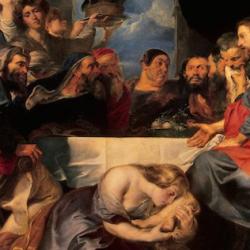Sermon outline for Sunday, January 18:
Lost and Found, Luke 15:1-35
INTRODUCTION
In Luke 15, we again see Jesus engaged in “table talk.” Tax collectors and sinners come to hear Him (v. 1), but the complaint from the Pharisees and scribes is that Jesus eats with them (v. 2). In response, Jesus tells a series of parables to defend His meal practices and to challenge His enemies to repent and join the meal.
THE TEXT
“Then all the tax collectors and the sinners drew near to Him to hear Him. And the Pharisees and scribes complained, saying, ‘This Man receives sinners and eats with them’” . . . . (Luke 15:1-35).
ONE PARABLE, THREE TELLINGS
In response to criticism, Jesus tells them “this parable” not “these parables” (v. 3). This is one story told in three parallel segments. Each of them tells of something lost ?Ea sheep, a coin, a son (vv. 4, 8, 32). In each, the person who has lost something searches diligently, even desperately, for it (vv. 4, 8, 20). The lost thing is found (vv. 5, 9, 32), and each story ends with the person calling together neighbors and friends to celebrate the recovery of the item (vv. 6, 9, 22-25). In the first two cases, Jesus explicitly draws a connection between the joy of finding a lost sheep or coin and the “joy in heaven” over a lost sinner who is found (vv. 7, 10).
Though the stories are obviously parallel, the third parable ?Eof the “prodigal son” ?Eis different in a number of respects: The father is waiting expectantly for his son, and runs to meet him, but we don’t see the father looking for his son as the shepherd looks for his sheep or as the woman looks for her coin. The third parable is much longer, and includes a lengthy “coda” about the elder son (vv. 25-32). Finally, the last story is not concluded as neatly as the first two; Jesus does not explicitly compare the story of the prodigal to the joy of heaven, but leaves things hanging at the end. (Even in the first part of the parable, though, Jesus tells us nothing of what happened to the “ninety-nine righteous persons.”)
The effect of this sequence is to emphasize the differences in the final story. The first two tellings of the parable set up a certain rhythm, but the third is a variation on the theme. That change in rhythm is the whole point of the third story, indeed the whole point of “this parable.”
LOST SHEEP, LOST COIN
Before looking in detail and the third, climactic story, we will examine some details of the first two stories, which are more closely parallel. The first, about a shepherd seeking sheep, picks up on a common OT image of God as the “shepherd” of Israel (Psalm 23; 80; Jeremiah 23:1-8; Ezekiel 34). Psalm 23 is an especially close parallel, since like Jesus’ parable the Psalm ends with rejoicing at a meal (Psalm 23:5-6).
The lesson Jesus draws from the parable, however, is surprising: Where in the parable is there any sign of “repentance”(v. 7)? The sheep doesn’t turn back, but has to be sought out and found by the shepherd. The parallel with Psalm 23 helps. Psalm 23:3a, often translated as “he restores my soul,” is better translated as “he causes my soul to retur” or even “he causes my soul to repent.” The Psalm pictures David wandering from the “paths of righteousness,” and being turned back to those paths by the Lord Himself. For David as for Jesus “repentance” is primarily something God does. It is true that we must repent, turning from our sinful way of life toward God (Luke 3:3, 8; 5:32; 13:3, 5). Unless the shepherd goes to seek the lost sheep, however, the sheep will not return and there will be no feast. Jesus, Incarnate Yahweh and the true Davidic shepherd-king, seeks out sinners so that they “turn back” and are restored. Repentance is not fundamentally turning but being turned.
This definition of “repentance” is even more apparent in the second stage of the parable. Does a coin “make the first move”? Again, repentance is being turned, an act of grace. In verse 10, Jesus says that there is “joy in the presence of the angels of God over one sinner who repents.” Note that this is not the joy of the angels. Joy in the “presence” of the angels can only be the joy of God Himself.
Like most of Jesus’ parables, these two are not atemporal “morality tales,” designed to teach lessons. They are about Jesus’ ministry. Jesus has come to seek and to save the lost; He has come to call the righteous and not sinners; He has come as the Physician to heal the sick. He has come for the tax collectors and sinners, and the meals that Jesus has with tax collectors and sinners express the “joy in the presence of the angels of heaven.” His meals celebrate the recovery of the sheep, the finding of the coin.
ALLEGORY OF ISRAEL
The third story is about a man with two sons (v. 11), and both of their stories are equally important. The younger son is more often the focus of attention. His journey to a far country and his eventual return is a retelling of the story of Israel. Israel is God’s son, and has been given a great inheritance by his father. Because of Israel’s contempt for Yahweh, he is sent out into a distant land, into exile. Finally, Israel returns. Instead of being angry with his returning son, the Father welcomes him and throws a feast. Instead of demanding repayment for the squandered inheritance, the Father gives back the son’s high position in the house, marked by a robe, a ring, and sandals (v. 22).
ELDER BROTHER
If Jesus only wanted to tell a third story about finding what was lost, this could have ended in verse 24. But Jesus continues on for several more verses, focusing on the reaction of the elder brother, who had remained at home. Instead of joining in the feast, he is angry at his father and his brother (vv. 28-30), and he insults his father by refusal to enter the house. But the father does not reject the elder son any more than he rejects his younger son. The story ends with the father’s defense of his feast, but we do not know whether or not the elder brother enters the house to join in.
In this third story, in the figure of the elder brother, Jesus has put his real-life enemies into his fictional parable. The elder brother stands for the scribes and Pharisees who are surly and angry that Jesus is celebrating with “younger brothers” who have “wasted their inheritance in riotous living.” The open-ended nature of the parable is an invitation to the Pharisees: The father’s words are addressed to the Pharisees who were sitting in front of Jesus as He told this story. At this point in Luke’s gospel, the future of the Pharisees is as open-ended as that of the elder brother.
Israel’s feast of return has begun, the feast that Israel had long been waiting to arrive. That is the feast that Jesus is celebrating. The Pharisees, however, refuse to join in. They exclude themselves from the joy. They would rather exile themselves than join a return that requires them to eat with tax gatherers and sinners.















